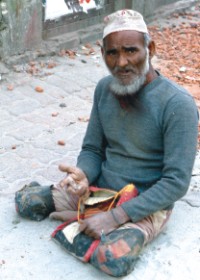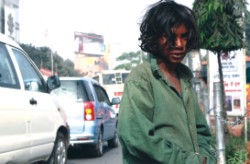|
Human Rights
Begging for a Living
On January 9, 2011 the cabinet approved the draft Vagrant and Shelterless People (Rehabilitation) Act 2010 in an effort to rehabilitate people who live in the street. But in an underdeveloped country like Bangladesh, it is not going to be easy for the government.
Shudeepto Ariquzzaman
 |
Many disabled people have little choice but to beg for survival.
Photo: Zahedul I Khan |
At one of the busy over bridges of a Dhaka intersection, 70-year-old Jobaida Begum carries out her trade. “I used to be a domestic worker, but because of ill health, I cannot work anymore. That is why I have to beg,” she says. Jobaida has just had a stomach operation but she does not have enough money for her medicine. “Begging is not my profession, but I have no other choice,” she says while tears run down her cheeks. “I feel embarrassed to ask people for money.” Jobaida had come to Dhaka from Bikrampur before the independence of the country, and her husband, a rickshaw puller, had perished from typhoid in the 80s.
“I cannot go home for two days, as my stomach still aches. I am sleeping here,” she says. Just then two children come to her running with some 2 taka notes. They are six-year-old Amena and eight-year-old Jamena. The old lady claims that they are her grandchildren. However, after more detailed questioning, it turns out that none of these two children are related to her by blood. They are children of her neighbours and they accompany Jobaida Begum to the overbridge every day. They also beg for money from pedestrians and when the day is over, the money is shared between them. Both children have working parents but they are sent to accompany Jobaida for some extra income.
When the two children were asked about their future plans, they reply without hesitation, “We want to be beggars.” They say that they are having quite an exciting time playing on the bridges and there is no reason for them to think of anything else to do. A passer-by remarks sarcastically, “What else can you expect from them? They are getting used to begging from such a young age and they will both grow up to be beggars.”
Like Jobaida, Mohammed Rais is also a beggar in the same intersection. But unlike Jobaida, whose physical condition does not allow her to approach motorists in the busy roads, Rais works on the streets that normally generate a better income owing to the huge number of motorists. Rais is physically handicapped and he has no livelihood skills. “I had polio since I was a month old. I have to take care of myself and my old mother who cannot work anymore,” he says. Rais says that his incomes vary from day to day. “Sometimes I earn 200-300 taka a day, generally it is somewhere around 150 taka.”
Rais says that he is worried about what to do during the World Cup. “All beggars, hawkers, and others who stay on the streets are going to be evicted from January 19.” In spite of that, he claims to bear no ill feelings towards anyone. “I love this country and I am willing to make this sacrifice,” he says quite strangely for a destitute beggar, “It is my Shonar Bangla (Golden Bengal).
 |
Nowadays, many vagrants are fearful of begging publicly in the streets.
Photo: Zahedul I Khan |
Not all beggars are living an utterly destitute life. Md Batem, also a polio victim from birth, resides in Bastuhara slum of Moghbazaar. Upon entering his house one can notice that this very well mannered and polished beggar has a VCD and a TV in his small room which he rents for 1100 Taka per month. It is not that he is very rich, but many hard working people residing on the lowest fringes of society will be a little jealous to see Batem's living standards and might consider adopting his profession. Sitting on his bed, his crippled legs covered by a blanket, few people who do not know him can guess his occupation.
But Batem also has his problems. “Some people shout and tell me not to sit there. That day a biker, a very well known man in the neighbourhood came and ordered me to go away. But I still occupy my corner,” he says proudly. Not only the locals, but Batem also has problems with his competitors i.e. other beggars.
One fine day, he discovered that other beggars had stolen his wheelchair. Fortunately for him, he knew some influential local people, and they ordered the thieves to return his wheelchair. “When I can save some money, I am going to open a tea shop in the neighbourhood,” he claims. Considering the VCD and TV in his room, his sincerity should not be taken for granted. Baten also says that he is very hopeful that the government will provide help to them and provide them with security on the streets so that they can work without fear.
Providing security to the beggars so that they can carry on with their trade on the streets might be the last thing the government has on its minds. In 2008 the government enacted a law banning begging, and made it punishable by a month in jail. In their election manifesto, Awami League had pledged to eradicate the practice of begging within five years.
On January 9, 2011 the cabinet approved the draft Vagrant and Shelterless People (Rehabilitation) Act 2010 in an effort to rehabilitate street people. As the law comes into force, thousands of beggars might be expected to be rehabilitated.
There are also some beggars who supplement their income with other forms of livelihood. At first sight Harun Miah of Dhanmondhi looks like any other beggar. But he also has an extra source of income-- selling marijuana to a selected group of customers. “I do not give this to just anybody, just the people I know and like,” he says.
According to a research conducted by Manusher Jonno Foundation (MJF), about 26 percent of the persons with disabilities were forced into begging by their own family members who also refused to take their responsibility. One of them is Md Akbar, who cannot use any of his legs. Akbar lives and moves in his cart. “I have come to Dhaka a year ago from Narsingdi. Because of my physical conditions, I cannot contribute to my family.” He says that his parents never liked that he could not earn for his family and following many disputes, he came to Dhaka. “I am doing better,” he says. “The rich people of this area give me money,” he says. “I have blankets and I earn enough to eat. I have also saved some money.” Md Akbar, along with seven other beggars resides under open air in a corner of a quiet street of the elite neighbourhood.
“The eight of us cook together, since it saves quite a lot of money,” he says. After a hard day's work, the eight of them gather in their free sleeping place under the open air and relax. They play cards, and occasionally drink and smoke marijuana. “I have a dream that one day I shall have my own small shop where I can sell cigarettes and paan. But it is going to cost as much as 10,000 taka to set up such a shop. I have requested a rich man in the neighbourhood to help me realise my dream.”
Recently, following the government drive to eradicate begging, most beggars are fearful of their future. They are especially afraid that as the World Cup approaches, they are going to be cleared off the streets, starting from January 19. Many are avoiding the main roads and only begging in the alleyways.
In one of the city's intersection, a group of beggars who generally limp using crutches can be seen bolting like rabbits at the first sign of a police van. While many beggars genuinely want a new life, many others are content with what they are. Rehabilitating many of them, especially those who do not want to leave this profession is going to be a challenge for the government. The conditions that force or lure people into this profession vary from people to people. Some beg because of disability, some because they cannot find work, others find it more profitable than a more dignified livelihood. The government might have to take some diverse issues into consideration if they want the rehabilitation programme to work.
Copyright
(R) thedailystar.net 2010 |
